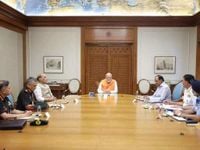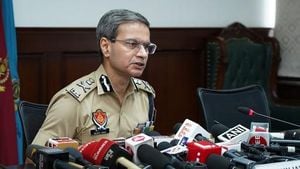Prime Minister Narendra Modi convened a crucial meeting on April 29, 2025, with top defense officials, including Defense Minister Rajnath Singh, National Security Advisor Ajit Doval, and Chief of Defence Staff General Anil Chauhan, in response to the tragic Pahalgam terror attack that claimed the lives of 26 people on April 22. This high-level meeting was aimed at reviewing national security and strategizing countermeasures against terrorism, particularly in light of the recent escalation in violence targeting civilians.
The Pahalgam attack, which occurred at a popular tourist destination in Jammu and Kashmir, has drawn widespread condemnation and raised significant concerns about security in the region. Modi has vowed to pursue the perpetrators and their sponsors, stating that the government will go to the "ends of the earth" to bring them to justice. This strong commitment underscores the Indian government’s resolve to combat terrorism, particularly given the long-standing accusations against Pakistan for its alleged support of such activities.
Earlier the same day, Union Home Secretary Govind Mohan led a separate high-level meeting with the chiefs of three paramilitary forces, including the National Security Guard (NSG), Border Security Force (BSF), and Assam Rifles, along with senior officers from various security organizations. This meeting was part of a broader effort to enhance security measures across the country following the Pahalgam attack.
In a related development, the Indian government has taken steps to ban 16 Pakistani YouTube channels, including prominent outlets like Dawn News and Geo News, for disseminating what officials describe as "provocative content" and misinformation about India and its military. This ban, enacted on April 28, 2025, affects channels with a combined following of over 63 million users and reflects the government's attempts to control the narrative surrounding national security issues.
As investigations into the Pahalgam attack continue, authorities believe that two Pakistani terrorists involved in the incident infiltrated Jammu and Kashmir approximately a year and a half ago. They reportedly entered the region through the Samba-Kathua area, cutting through security fences, and have been linked to previous terror incidents in the Valley. The Ministry of Home Affairs had previously scrutinized the infiltration routes following other attacks, highlighting ongoing security challenges in the region.
The aftermath of the Pahalgam attack has also seen a significant shift in public sentiment and political discourse. Maharashtra Chief Minister Devendra Fadnavis announced a financial assistance package of Rs 50 lakh for the families of the victims from the state, emphasizing the government's commitment to support those affected by the tragedy. Additionally, the Jammu and Kashmir government has pledged an ex-gratia payment of Rs 10 lakh to the families of the deceased and Rs 2 lakh for those injured.
Political reactions have been swift and varied. Congress President Mallikarjun Kharge has called for a special session of Parliament to discuss the attack and the broader implications for national security. He emphasized the need for unity in the face of such tragedies, urging all political parties to come together to address the situation. However, the Congress party has faced criticism for its responses, with BJP leaders accusing it of politicizing the tragedy. BJP spokesperson Shehzad Poonawalla challenged the Congress to clarify its stance on the attack, pointing out contradictions in their statements.
In the wake of the attack, security measures have been tightened across the Kashmir Valley, with many tourist destinations temporarily closed to the public. Over half of the tourist spots in the region have been shut down as a precautionary measure, reflecting the government's heightened focus on ensuring the safety of both locals and visitors.
The Pahalgam attack has also sparked international reactions. External Affairs Minister S. Jaishankar expressed gratitude to Cyprus for its solidarity following the incident, highlighting the global implications of terrorism. Furthermore, India's Deputy Permanent Representative to the United Nations, Yojna Patel, condemned the attack, labeling it the worst civilian assault since the 2008 Mumbai attacks.
Amidst the chaos, voices from the ground have emerged, including those of the victims' families. Pragati Jagdale, the wife of one of the victims, urged political leaders to refrain from using the tragedy for political gain, stating, "Don’t play politics with our grief." Her poignant remarks reflect the deep emotional scars left by the attack and the desire for genuine support rather than political maneuvering.
As the situation unfolds, the Indian government is intensifying counter-terrorism operations across Jammu and Kashmir. Reports indicate that security forces are actively pursuing leads related to the attackers, with a focus on preventing further violence. The ongoing operations are part of a broader strategy to restore security and stability in the region, which has been marred by violence for decades.
In conclusion, the Pahalgam terror attack has not only claimed innocent lives but has also reignited discussions about national security, terrorism, and the political landscape in India. As the government takes decisive action, the hope remains that justice will be served, and measures will be implemented to prevent such tragedies in the future.





